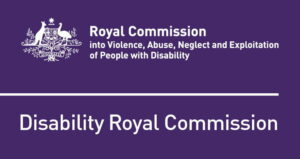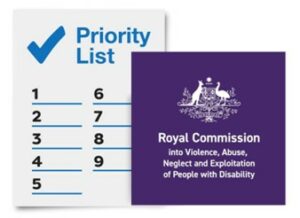Inclusion Australia staff member, Brooke Canham shares her thoughts on the Disability Royal Commission’s closing ceremony and the final reports recommendations.
Reflecting on the Disability Royal Commission closing ceremony and Recommendations

The Disability Royal Commission Closing Ceremony September 2023
The Disability Royal Commission has now finished. It held 32 public hearings, more than 800 people gave evidence and 8,000 submissions were written. 4,000 of those submissions were from people with a disability.
We know that there were lots of people with an intellectual disability that did not get to share their stories.
On Friday 15 September the Disability Royal Commission held their closing ceremony. They showed footage from the Disability Royal Commission’s hearings of people who have lived experience, family members and other supporters. The footage was very emotional.
Poet, Andy Jackson spoke at the closing ceremony. The first poem Andy Jackson read was about Mutual Obligation. It was very interesting. The second poem was called Listen. This poem made me feel strong, it was touching and very interesting. The poem was about being able to rest, being able to breathe and to be nourished. This meant a lot to me because sometimes, I need to rest and take a break.
The final report and final recommendations from the Disability Royal Commission
 The Royal Commission has now handed down its final report.
The Royal Commission has now handed down its final report.
There are 222 recommendations in the final report.
The recommendations talk about what changes need to happen to meet the vision for an inclusive Australia. It tells us how governments and other decision makers need to come together and work as a team to create more inclusion.
Visions are ideas about how people want things to be in the future. Some people want a future where people with disability are safe, and their rights are respected. A future where you can make your own decisions and live a full life.
There are some things I think are most important for the government to act on:
- Making it harder to become a service provider by having more checks and procedures that need to be met
- All documents should be in Easy Read so people can understand and be able to process all the information they need
- Making government systems inclusive and easier for people with an intellectual disability to understand and follow instructions
What happens next?
The Disability Royal Commission has been very important for people with an intellectual disability. They have had a chance to have their voice heard and be able to talk about their lived experience.
Now it is time for the government to act and make the recommendations from the Royal Commission happen. During the public hearings we heard so many stories of violence, abuse, neglect and exploitation that people with disability—including people with an intellectual disability—face in daily life.
If the government does not act, people will just keep experiencing this violence and nothing will change. We cannot let this happen and must make those peoples’ stories have meant something for the future.
You can find all the Disability Royal Commission Easy Read reports here: Disability Royal Commission Easy Read reports – Inclusion Australia
